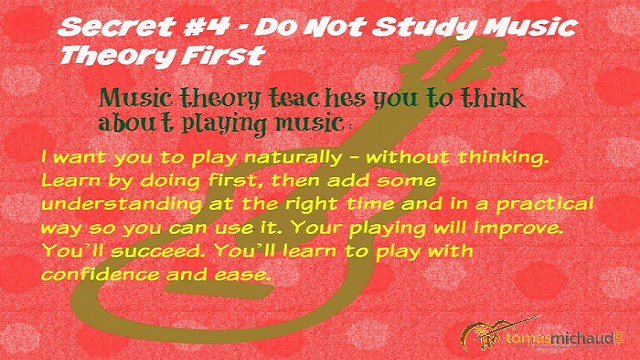Learning Spanish And Playing Guitar
Answer this question: What does learning guitar have in common with learning Spanish?
Stick with me a moment. As a young adult, I set a goal to learn to speak Spanish. I enrolled in Spanish language classes at my local community college and made my mind up to really apply myself.
I studied for three quarters. I did all the homework. I even got some extra private tutoring… all the things I learned to do to get my university degree. And you know what? I not only passed but passed with flying colors. Straight “A”s! Awesome… right? Not so much.
After a year of “applying” myself, I couldn’t speak Spanish. I could read basic material and, with the help of a dictionary, understand much of it. I could recite grammatical rules and write out many, many verbs with their many conjugations. I could even recite a few phrases in an almost intelligible manner, but I couldn’t communicate in the Spanish language.
The reason I tell you about my experience with learning Spanish is that it’s a mistake us adults often make when we go about learning languages. I think you can catch what I’m getting at. Music IS a language. Learning music on any instrument by studying theory first is not only a very slow way to learn, but often very discouraging and possibly a way to never arrive at playing with ease and grace.
Everything Looks Like A Nail
As adults, we have been conditioned to rely on our intellect to succeed in many aspects of our lives, all the way from grade school and through our working life. Understanding concepts and solving problems helped us get through that sixth-grade math test and helped us climb the corporate ladder. When learning a skill like guitar, it might seem natural to try to understand the concepts first, then practice the skills. I can tell you from my own experience, and that of many others, that it just doesn’t work. In fact, it’s a significant roadblock for many adults.
Think of the concept known as “the law of the instrument” attributed to the renowned psychologist Abraham Maslow. It goes like this: “if all you have is a hammer, everything looks like a nail”. My understanding is that us humans have a tendency to become overly reliant on a familiar tool or way of seeing things. Intellect is a useful tool, but not the best or “go-to” tool for learning guitar.
The mind cannot fully grasp the skills and relationships involved in a complex skill like playing guitar when you’re first learning. The problem is that the mind latches on to this failure to completely “get it” and uses it as justification for not wholeheartedly practicing the material. This resistance to practicing actually prevents many of the “ah-ha” moments that would otherwise come with time.
I sometimes look back on my college years and think I spent more time talking about music than playing and creating inspired music. In a way it was easier for me to think about music than to actually create and play something that might be judged by others. Theory and understanding do have its place, and it has real value—it just doesn’t replace practice, patient curiosity, and opening your heart to inspiration.
The way to solve this problem is, as best you can, to let go of trying to fully grasp music theory, and especially why something works. Accept it at face value and adopt an attitude of patience and curiosity. Learn small bits of music theory and apply them. Music theory may be interesting, but if not applied it is almost always lost

The Best “tools” For Learning Guitar?
My “learning Spanish” story didn’t end there. I realized what I was doing wasn’t working and being the persistent bugger that I am I regrouped. First I made a concerted effort to meet native Spanish speakers who would be willing to trade guitar lessons for tutoring in speaking Spanish (not grammar). I made some great friends in the process and began to see slow but steady progress.
Then I found a program where I would go to Spain, take classes daily and live with a family that spoke ONLY Spanish. No English. In fact I later found out that they were instructed not to speak a word of English with me even if they knew some phrases. I won’t say it was easy, but after 10 days I was communicating in Spanish.
Not only was I speaking and understanding the language but I had crossed through a kind of threshold. Though my skills were still in the “baby stage” I began to see myself as someone that could actually speak Spanish. From that point on I practiced with whoever would put up with my fumbling language ability. I watched Spanish programs on TV. I traveled to other Spanish speaking countries for short trips and eventually spent the entire summer in Guatemala.
What all these activities had in common is they provided me an opportunity to repeat words and phrases many times (repetition) and often get feedback. This is also what works when learning guitar. To summarize the process its 1) learn a small slice of something new 2) apply repetition 3) get feedback, and 4) make adjustments.
1. Chunk It Down
To learn a complex skill like guitar the first step is to chunk it down. This means to break it down to manageable steps that build one on another. Start with the basic building blocks and methodically add more and more “chunks” as you progress. Some of the basic building blocks of playing guitar are basic chords, learning to change chords in time, training the fingers with exercises to go to the right places on the guitar neck, and so on.
2. Repeat… Then Repeat Again
Repetition is a cornerstone of any skill that involves a body-mind connection. By repeating a physical action over and over the mind records the process and stores it. At first, it can be a very conscious process, but little by little it becomes automatic. As it becomes automatic your mind becomes free to make musical judgments and not spend the energy and focus on just controlling the individual movements.
Of course, in the beginning, it can be very tedious. Most of us would prefer to find some shortcut to avoid this. A better approach may be to just accept that repetition is a vital part of the process. Then you can stop spending energy on looking for shortcuts and put your heart into it.
3. Feedback Is The Breakfast Of Champions
The process of making a conscious task automatic is non-judgmental. The mind will record the actions whether you do them correctly or poorly. Correctly means doing it in a way that supports future progress and playing the guitar with ease. This is why it’s important to get constant feedback to adjust what you're doing.
Without feedback it's easy to find yourself in the place of having many bad habits that have to be undone or dealt with in some way later. No one makes a straight path to awesomeness, but feedback is what allows you to make course corrections.

I was once told that when you get on an airplane it doesn't really take a straight line to where you're going. The pilot has the intention of getting to the desired destination and makes constant adjustments based on feedback from his control panel and the control tower. Without this feedback the plane would likely get hopelessly off course.
When learning guitar there are many possible forms of feedback. Feedback from a competent guitar instructor can be a vital part of the learning process. But even more important is using and developing your own listening skills.
Let Your Ears Be Your Guide
When you practicing you'll want to train yourself to listen to what you're playing. If you're learning to play from an online course you'll want to compare what you're playing with the lessons. Keep making adjustments until you're playing sounds close to the lesson.
At other times you'll be comparing it to what you've heard others play or what you hear inside your head. This is one of the key skills to learning to improvise or create your own music.
I realize as well as anyone that all of this is easier said than done. I would encourage you, as I have learned, to be patient with yourself. Even though you don't understand the relevance of an exercise try as best you can to practice it until it becomes a part of you. Over time you’ll find that understanding often comes after you have practiced and assimilated the material.
The key phrase in what I’ve just said is “as best you can.” Getting hung up on the mind-chatter you hear in your head leads to self-criticism and less practice.
Related Posts:
First Secret To Playing Awesome Guitar… Violate This At Your Own Peril
Secret to Learning Guitar #2 – Slow, Deep Learning Is Best
Guitar Learning Secret #3 – Learn In The Correct Order
What do you think? Leave a comment and let me know what your experience is with learning theory and playing guitar.

The next to last phrase is exactly what I have been doing sense I picked up the guitar. I wished I had heard that years ago I criticize what I am trying to to the point I do put off practicing because I don’t feel its right, now I will just try and do what I can do and let it go. Thank you for your advice keep up the good work that you do.
Agree with you wholeheartedly about learning by doing. The teaching method of show and tell and practicing what one have just observed enhances the learning process. One should be willing to put in the time to apply what is being taught with consistent practice.
Hi Tomas, I’M Still here. Yes, I have been receiving your e-mails, and have read them all, plus, doing the modules. I’m on module #2 now, and enjoying your program. Herb
I went on vacation for 3 months. Just updating on your site. Nice work and thanks.